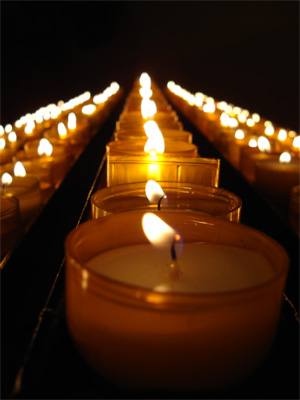This post is the first in a series of posts called “Living Life in the Light of Faith” a chapter-by-chapter exploration of Pope Francis’ first encyclical letter “Lumen Fidei“—the Light of Faith. Even this series only scratches the surface of it, so I suggest you read the entire letter.

What is Faith?
When we talk about faith we are not talking about the beliefs held by the Church, important though they may be. We are talking about the relationship we have with God. This means we don’t see Him as some superior being in a galaxy far away, but rather so close that He cannot be ignored.
“Faith is our response to a word which engages us personally, to a ‘Thou’ who calls us by name.”
~ Lumen Fidei, 8
It’s also important to remember that faith is a gift, for God must first call us and we must choose to freely respond. Faith is not forced, it is free. For if love is forced than it is false. Of course, God desires our love and created us for that sole purpose, but He never forces us to love Him. He would do anything for us that we would love Him, but it has to come from within us.
The Past and the Promise
Catholics are often criticized for focusing too often on the cross. Every Catholic church you go into will always have a crucifix—not just a cross, but a cross with a corpus or body on it. This isn’t to say we believe that Jesus remains on the cross, but it is important to remember what Jesus did for us. When we look at Jesus on the cross, we see the meaning and expression of true love.
“As a response to a word which preceeded it, Abraham’s faith would always be an act of remembrance. Yet this rememberance is not fixed on past events but, as the memory of a promise, it becomes capable of opening up the future, shedding light on the path to be taken.”
~ Lumen Fidei, 9

It is true also to say that although “we preach Christ crucified”—and living the cross in our daily lives—our focus is always on the resurrection. We aren’t stuck in the past, but looking forward to “the memory of a promise” as Francis puts it. That promise is of course “the resurrection of the body and life everlasting”.
However, although Heaven has a lot to do with what we believe and do as Christians, we are not closed to the idea of bringing about the reign of God in the here and now. Being a Christian is more than being a good person and hoping to go to Heaven one day. Being a Christian is to be a man or woman of faith.
A Faithful Relationship
When we think about relationships and fidelity, we think about trust. Placing our trust in God we know that He will be faithful to His promises, but it also requires that we be faithful to Him. Fidelity in any relationship is a two-way street. Both parties must be faithful to each other.
“The man of faith gains strength by putting himself in the hands of God who is faithful.”
~ Lumen Fidei, 10
Today and everyday the Christian is called to faith, both to have faith and to be faithful. This faith is more than a mere idea, it is an intimate relationship with the giver of this great gift. What does it mean to put yourself in the hands of God? Well, first off, it’s important to realize that you yourself are not God, that there is someone greater than you, and that this someone loves you more than you can ever imagine.
“Man is faithful when he believes in God and his promises; God is faithful when he grants to man what he has promised.”
~ St. Augustine
Holding belief in God is only part of what faith is about, but we must also order our lives in accord with this belief. If God is truly the source and end of our existence, then He must be primary to all that we do. Our lives must be totally influenced by Him and directed towards the intimate union with Him, both in this life and the next.
Personal But Not Private
The walk of faith, this relationship of intimacy with God, is a personal relationship, but not a private one. Yes, God wants us to know Him personally, but that doesn’t mean all of our fellow Christians are on their own does it?
“Faith is not a private matter, a completely individualistic notion or a personal opinion: it comes from hearing, and is meant to find expression in words and to be proclaimed.”
~ Lumen Fidei, 22

We know God in prayer and in community. We see Him alive and at work in the lives of those around us. And with every gift comes responsibility, so we are ultimately responsible for sharing this gift with others. But only if we truly experience this intimacy with God are we able to invite others into it. We can’t tell people how good God’s love is unless we have actually experienced it first hand. And once we have, it is our duty and pleasure to proclaim it to the world. It’s like that same feeling we had when we first fell in love, we desire to tell the whole world how great it is. And even if we don’t say anything, they can see it written on our face. This is how we share the faith. This is how we evangelize.
Our faith is like the flame of a candle, it might not seem powerful enough to change the world, but how many other candles can be lit from that one tiny flame? All it takes is one candle to give enough light in a room for all to see. And as the light is shared the brighter it gets. This is the light of faith.
Faith is not like a material thing that we lose when we give it away, in fact it is quite the opposite. The only way for it to grow is for us to give it away. How will you share the light of faith with someone today?
This post is the first in a series of posts called “Living Life in the Light of Faith” a chapter-by-chapter exploration of Pope Francis’ first encyclical letter “Lumen Fidei“—the Light of Faith. Even this series only scratches the surface of it, so I suggest you read the entire letter.